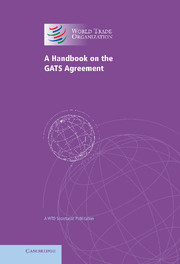Book contents
- Frontmatter
- Contents
- Preface
- Introduction
- 1 Basic purpose and concepts
- 2 Main building blocks: agreement, annexes and schedules
- 3 A closer look at domestic regulation
- 4 How the GATS is administered
- 5 The role and responsibilities of Member governments
- 6 The challenges ahead
- 7 Preparing requests and offers
- 8 Misconceptions about the GATS
- Appendix 1 Understanding your country's services trade
- Appendix 2 Relevant services statistics and classifications
- Annex: General Agreement on Trade in Services
- Index
6 - The challenges ahead
Published online by Cambridge University Press: 07 October 2011
- Frontmatter
- Contents
- Preface
- Introduction
- 1 Basic purpose and concepts
- 2 Main building blocks: agreement, annexes and schedules
- 3 A closer look at domestic regulation
- 4 How the GATS is administered
- 5 The role and responsibilities of Member governments
- 6 The challenges ahead
- 7 Preparing requests and offers
- 8 Misconceptions about the GATS
- Appendix 1 Understanding your country's services trade
- Appendix 2 Relevant services statistics and classifications
- Annex: General Agreement on Trade in Services
- Index
Summary
THE DOHA DEVELOPMENT AGENDA
The Uruguay Round marked only a first step in a longer-term process of services liberalization within a multilateral framework. The importance of the Round lay less in its improving actual market conditions than in creating a completely new system of rules and disciplines for future trade liberalization. This may also explain why the GATS, in Article XIX:1, already provides for a new round of services negotiations to start not later than five years from the date of entry into force of the Agreement.
Consequently a new services round was launched in January 2000. It aims to achieve a progressively higher level of liberalization of services trade while “promoting the interests of all participants on a mutually advantageous basis and … securing an overall balance of rights and obligations” (Article XIX:1). Although the Seattle Ministerial Conference in late November 1999 failed to agree on launching a larger trade round, the mandate to negotiate on services was never put in doubt. In contrast to the preparatory stages of the Uruguay Round, Members no longer focused on whether, but rather on how, to promote services liberalization within the multilateral system.
As a first step in 2000, and as part of an information exchange programme mandated at the Singapore Ministerial Conference, the WTO Secretariat prepared a series of background papers on major services sectors (available on the WTO website) to stimulate policy discussion and promote dissemination of relevant information among Members.
- Type
- Chapter
- Information
- A Handbook on the GATS AgreementA WTO Secretariat Publication, pp. 35 - 42Publisher: Cambridge University PressPrint publication year: 2005

